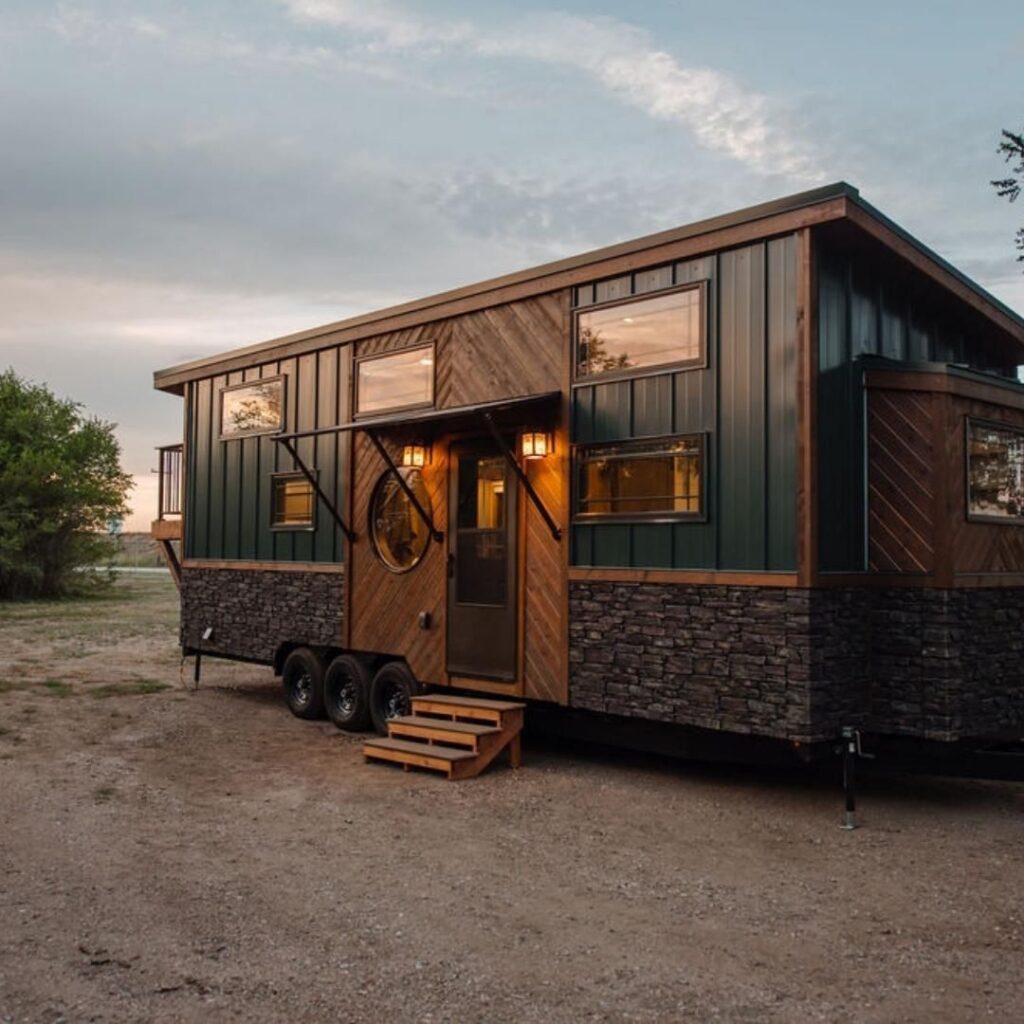Tiny House on Wheels vs Foundation – Which Is Best?
Deciding between a tiny house on wheels and one on a foundation can feel like standing at a crossroads. Each path offers its own set of freedoms and limitations, shaping not just where you live but how you live.
Today, I’ll tell you everything you need to know to decide whether to go with a tiny house on wheels or a foundation. From mobility to legality, you’ll learn everything to help you find the route that best suits your dreams of tiny living.

Tiny House on Wheels vs Foundation
It’s crucial to explore the key differences between tiny homes built on wheels and those set on a foundation. Each choice impacts the lifestyle and legal considerations of tiny living.
Tiny houses on wheels, often referred to as THOWs, offer unmatched mobility. This means I can easily relocate my home and explore new places without the hassle of traditional moving processes.
However, THOWs face certain legal constraints. For instance, many areas classify them as recreational vehicles (RVs), which can limit where I can park and reside long-term.
Additionally, securing financing and insurance for a THOW often proves more challenging than for a stationary tiny house.
On the flip side, tiny houses built on a foundation provide a semblance of permanence and stability. These structures are typically subject to local building codes and regulations but come with the benefit of being considered real property.
This classification can ease the process of acquiring loans and insurance. Living in a foundation-based tiny house also means I don’t face the zoning and RV park restrictions that come with THOWs.
However, this option sacrifices the mobility that defines the THOW lifestyle.
With all that in mind, let’s now check out some pros and cons for both.
Pros and Cons of Tiny Houses on Wheels

Building on the comparison between tiny houses on wheels and those on a foundation, let’s check out the advantages and disadvantages of opting for a tiny house on wheels.
Mobility and Flexibility
Tiny houses on wheels stand out for their mobility. Owners enjoy the freedom to change locations, reflecting a nomadic lifestyle that appeals to many.
This mobility allows homeowners to explore different regions without the hassle of property sales or prolonged lease agreements.
Legal and Zoning Challenges
However, the classification of tiny houses on wheels as RVs introduces legal constraints.
Many regions have specific zoning laws and regulations that limit where tiny houses on wheels can be parked legally, often restricting them to RV parks for long-term stays.
Handling these legal challenges requires diligence and could complicate the living situation.
Cost-Efficiency
Tiny houses on wheels typically demand a lower upfront investment compared to their foundation counterparts.
Since you don’t have to purchase land nor worry about the costs of establishing a foundation you’ll be saving quite a bit of money!
The absence of land purchase and foundation construction costs makes them a cost-efficient choice for individuals looking to minimize expenses.
Reduced Stability
Despite these benefits, tiny houses on wheels lack the stability of foundation-based homes.
Susceptibility to weather conditions, particularly in extreme climates, and the ongoing maintenance of tires and trailers can pose challenges to those seeking a low-maintenance lifestyle.
Access to Conventional Utilities
Connecting a tiny house on wheels to conventional utilities such as water, electricity, and sewage might pose challenges, depending on the location.
While some opt for off-grid solutions like solar panels and composting toilets, others might find the lack of straightforward utility connections a significant drawback.
Pros and Cons of Tiny Houses on Foundation

Transitioning from the exploration of tiny houses on wheels, I’ll now delve into the advantages and drawbacks of tiny houses on a foundation.
Pros
Stability and Safety
Unlike their wheeled counterparts, tiny houses on a foundation offer enhanced stability and safety due to their permanent attachment to the ground.
This construction minimizes the risks associated with mobility, such as towing accidents or adverse weather effects.
Regulatory Benefits:
Tiny houses on a foundation often face fewer legal barriers.
They’re typically subject to residential building codes, making it easier to comply with local regulations, secure permits, and gain acceptance in more communities.
Financial Advantages:
Financing a tiny house on a foundation can be more straightforward compared to one on wheels.
Lenders are more willing to offer mortgages for structures on a permanent foundation, and homeowners may also benefit from increased property value over time.
Utility Access:
Connection to utilities like water, electricity, and sewage is usually simpler for tiny houses on a foundation.
Permanent access eliminates the need for the portable solutions required by tiny houses on wheels.
Cons
Reduced Mobility:
The most significant drawback of choosing a foundation is the lack of mobility.
Homeowners can’t easily relocate their house to explore new areas or move closer to job opportunities, friends, or family.
Higher Initial Costs:
Building or placing a tiny house on a foundation generally incurs higher initial costs.
This includes expenses related to land purchase, excavation, foundation construction, and utility connections.
Zoning Restrictions:
Although regulatory benefits exist, zoning restrictions can be a formidable challenge.
Finding the right location where tiny houses on a foundation are accepted might require navigating complex zoning laws that vary significantly between different areas.
How to Decide Between a THOW or Foundation

While both options present unique advantages and challenges, it is essential to examine your personal lifestyle, financial situation, and long-term goals closely.
Lifestyle Needs
If you value flexibility and a nomadic lifestyle, a tiny house on wheels seems like a no-brainer. Its mobility allows for exploration and living in diverse locations.
However, for individuals seeking stability, community ties, and a fixed address, a tiny house on a foundation offers a sense of permanency and belonging.
Financial Considerations
Financially speaking, a tiny house on wheels often requires a lower upfront investment, which is attractive for those on a tight budget.
Moreover, the possibility of bypassing property taxes in some jurisdictions can result in long-term savings.
Conversely, a tiny house on a foundation might come with higher initial costs but offers the advantage of traditional property financing options, potentially increasing its investment value over time.
Legal Issues
Navigating the legal landscape is another critical factor. A tiny house on wheels, classified as an RV in many places, faces restrictions regarding where it can be legally parked and lived in long-term.
On the other hand, tiny houses on a foundation, while subject to zoning laws and building codes, generally encounter fewer legal hurdles in being recognized as a permanent residence.
Conclusion
Deciding between a tiny house on wheels and one on a foundation boils down to what you value most in your living situation.
If freedom and flexibility are at the top of your list, a wheeled option might be right up your alley.
However, if you’re seeking a sense of permanence with fewer legal hurdles, a foundation-based tiny house could be the better choice.
